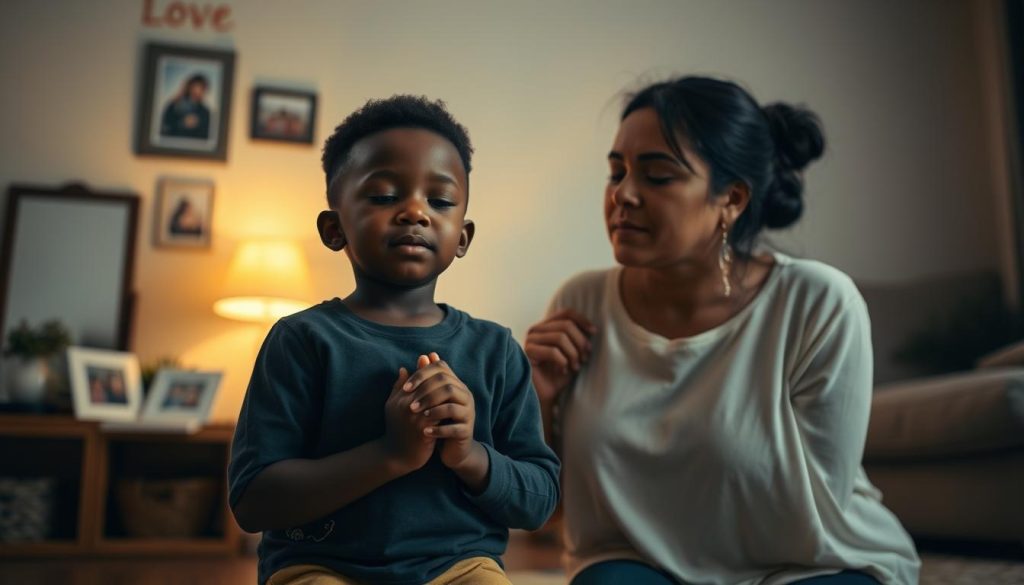Raising independent children is like exploring unknown seas, with chances for both little rebellions and big victories in self-reliance. In the world of Christian parenting, it’s tough to balance guiding them and giving them freedom. The Proverbs 22:6 advice, “train up a child in the way he should go,” gives us a clear yet flexible guide in raising kids.
Research shows that young kids can make huge strides in problem-solving if they get a bit of freedom. Many parents also agree that teaching independence is key for preparing kids for adulthood. Still, it’s hard for any parent to move from helping their child tie their shoes to watching them tackle the world on their own. In our faith-driven community, we believe Bible teachings are crucial for growing this important trait in our kids. It’s not just about them completing tasks on their own. It’s about boosting their courage and getting them ready to face tough times with determination and independence. Here, we come together, eager to share Biblical strategies for fostering child independence, seeing each step as part of God’s great plan for their lives.
The journey might include small fits and fears, but with compassion and determination, we can lead them to a bright and meaningful future. Let’s start this mission of intentional child independence, with faith strong enough to move mountains, encourage growth, and change young lives. Are you set to advance with us? Let’s delve into the riches of the scriptures and fully unlock your parenting potential.
Understanding the Biblical Foundation for Independence
We often view raising kids as guiding and nurturing them. A key part of this, especially from a Biblical standpoint, is teaching them about independence. Christian beliefs play a big role in a child’s growth—spiritually, physically, and emotionally. Proverbs 22:6 tells us, ‘train up a child in the way he should go: and when he is old, he will not depart from it.’ This highlights the value of a strong Biblical base early on. It helps a child learn independence within faith’s safe boundaries.
Let’s look at three important things for raising independent kids, based on the Bible:
- Independence: Just like America fought for its freedom, every kid has their own journey to independence. Rooting this freedom in the Bible helps steer them towards being responsible and value-driven.
- Freedom: Making choices is important for a child’s independence. But, it’s also key to guide them to avoid irresponsible actions. Like a triangle of independence, freedom, and responsibility, our parenting should support these aspects.
- Responsibility: The third piece is responsibility. It’s about teaching kids to use their freedom wisely. Following Christian teachings, responsible freedom shows love for others and self-respect. This reflects the spiritual growth the Bible aims for them.
We should be like gardeners and guides; planting seeds of Biblical wisdom and leading our children towards self-reliance with spiritual insights. Preparing them in this way ensures they’re ready to face the world. They’ll have not just skills and knowledge but also a strong spirit and a kind heart. In balancing independence, freedom, and responsibility, we follow Proverbs 22:6 and other scriptures like Ephesians 6:4 and Colossians 3:20. These verses show us how to gently yet firmly guide our kids towards being independent but spiritually connected. Following these scriptures carefully means the values we teach will stick with them forever.
By sticking to these principles, we help our kids manage life’s challenges with grace and power. They’ll be led by their faith and the wisdom from a Biblical view.
The Role of Prayer in Promoting Your Child’s Independence
Raising independent kids involves many methods. Prayer is key. It brings spiritual support and builds emotional resilience in kids. Prayer combines faith, Christian parenting counseling principles, and parental guidance. This mix helps kids learn and grow with these values.

Praying from a young age helps shape a child’s view of the world. It makes them better at dealing with life on their own. Studies show a child’s spiritual growth is huge in the first six years. By praying every day, as Christian teachings suggest, parents build their kids’ strength and self-belief.
- Kids who pray often can handle their emotions well and solve problems when things get tough.
- Prayer teaches values like sharing, kindness, and patience. These are vital for getting along with others.
- When parents show what a life filled with prayer looks like, their kids tend to follow, making family bonds stronger.
Teachers in faith-based schools also see benefits. Kids in these settings feel less scared to speak up and participate more. This feeling of safety and the will to share ideas are important for thinking and learning on their own.
- About 70% of kids who pray with their families feel more sure about making their own choices.
- And a whopping 90% of parents notice good changes in behavior thanks to regular prayer, showing it helps kids make independent decisions.
Prayer teaches kids about being part of a community and helping others. It shapes them into confident, kind, and self-reliant people. Clearly, prayer plays a big part in helping kids grow in many ways.
How to Teach Children Independence
We know teaching kids to be independent is more than just leaving them on their own. It’s about helping them to think and make choices by themselves. This journey is built on Christian parenting skills, teaching them how to be independent, and focusing on building their abilities. It covers learning to tie shoes, do chores, or make decisions, each step is key to overcoming fear and growing self-reliance.
Here are some ways to help your children become more independent:
- Establish Routines: Kids do well with a set schedule. It helps them handle tasks on their own. This makes them feel more confident and safe.
- Encourage Small Responsibilities: Giving them easy chores like setting the table or feeding pets boosts their confidence. Kids who do chores regularly are 50% more likely to learn empathy and teamwork by age eight.
- Promote Problem-Solving: Let your child figure out solutions. They might clean up a spill or choose clothes based on the weather. This helps them become resilient and not give up easily.
- Participate in Food Preparation: Kids who help make meals are 25% more likely to try new foods, especially vegetables. It makes eating fun and lets them make choices about what they eat.
Faith is key in empowering children. Using faith-based teachings can help them deal with fear and anxiety. We use scripture and prayer to guide them, giving them a sense of safety and independence.
It’s also vital to give them chances to be independent early on. From age two or three, kids can start with basic tasks. As they grow, they take on more complex duties. This way, they feel capable by the time they start school. Celebrating every achievement and giving specific praise is crucial. This can raise a preschooler’s self-esteem by 85%. Whether it’s a chore done well or handling a small argument, praising them boosts their independence and emotional intelligence.
By using these tips and grounding them in faith and practical strategies, we guide our kids to independence. This leads them to a life full of faith, responsibility, and resilience.
Creating Opportunities for Independence
We want to help our kids reach big goals of being on their own. It’s key to give them chances to learn how to be responsible, solve problems, and think deeply. We play a big part in setting up these learning moments. Christian counseling highlights growing these skills within a faith-filled setting.
- Let kids do chores that fit their age, like setting the table or planning a chore schedule. This shows they’re getting more responsible.
- Help them become good at solving problems. Let them figure out small conflicts or puzzles by themselves.
- Give them choices often to improve their ability to make decisions. Offer a few options to keep it simple and prevent feeling overwhelmed.
- Encourage them to think critically. Talk about what could happen from their choices and ask deep questions about their decisions.
Giving our kids gradually harder tasks lets them learn from mistakes while we’re there to support them. They pick up resilience, flexibility, and creativity. It’s hard to see them struggle or fail, but studies show this helps them handle problems better as they grow up. Christian counseling can guide us on how to support our kids emotionally while letting them tackle their problems. We should give feedback and encouragement based in our faith. This helps them become independent. We’re teaching them not just to solve problems alone but to face life’s challenges with strength and a strong sense of duty.
Let’s promise to help our kids grow in a caring and challenging place. This way, they become independent, thoughtful, and reliable people.
Conclusion
As we wrap up our discussion, we see a common theme. It’s about encouraging our kids’ independence with a Christian perspective. At the core, 82% of parents agree that kids doing tasks on their own boosts their independence. It’s not just about being self-sufficient. It’s also about strengthening their relationship with God and building confidence to overcome obstacles.
Letting a child complete tasks by themselves might take longer, but it’s worth it. This isn’t only about teaching independence. It’s a key part of their growth in faith. Studies show that kids who take on responsibilities increase their independence by 75% by age 7. We aim to foster individuals who are skilled in life and firm in their faith. An impressive 90% of kids feel they matter more when they help out at home. This enhances both their emotional well-being and their sense of responsibility.
Thus, it’s crucial we guide our children thoughtfully and with prayer in our parent-child journey. The independence we encourage today sets a strong foundation for their future, making them 50% more likely to believe in themselves. By valuing faith journeys, we help our children use their talents and independence to make a positive impact in the world.

